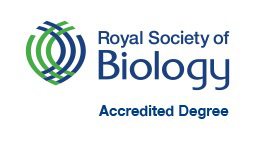Plant Biology (with integrated year in industry) Code C20F Attend an Open Day Attend an Open Day
Apply NowKey Facts
C20F-
UCAS Tariff
48
-
Course duration
5 years
Available for September start 2026
Further details on entry requirements
Apply NowThis course includes an integrated foundation year.
Excellent career opportunities await Plant Biology graduates, and Aberystwyth University is an ideal place for the first step in your career. We host internationally acclaimed plant breeding programmes for high-sugar grasses, plant genetics resources and databases, botany gardens and the National Plant Phenomics Centre. Our campus is also set within beautiful and accessible countryside that hosts a range of habitats and species.
On the Plant Biology degree at Aberystwyth University you will study all aspects of plant life, from the molecular to the landscape levels, while also examining global issues relating to plants. You will consider how plant-based technologies can help us meet the demands of a growing human population and respond to global threats including food security and climate change. The course will also provide you with real-life opportunities to challenge your knowledge and think creatively.
This course is accredited by the Royal Society of Biology.
Course Overview
Modules September start - 2026
Please note: The modules listed below are those currently intended for delivery during the next academic year and may be subject to change. They are included here to give an indication of how the course is structured.
| Module Name | Module Code | Credit Value |
|---|---|---|
| Communication Skills | BR01520 | 20 |
| Molecules and Cells | BR01340 | 40 |
| Organisms and the Environment | BR01440 | 40 |
| Practical Skills for Biologists | BR01220 | 20 |
| Module Name | Module Code | Credit Value |
|---|---|---|
| Cell Biology * | BR17520 | 20 |
| Crop, grassland, soil and agricultural land management * | BR18040 | 40 |
| Genetics, Evolution and Diversity | BR17120 | 20 |
| Microbial and Plant Diversity * | BR19920 | 20 |
| Skills for Biologists * | BR16820 | 20 |
| Module Name | Module Code | Credit Value |
|---|---|---|
| Agronomy and Crop Improvement * | BR27620 | 20 |
| Climate Change: Plants, Animals and Ecosystems | BR21120 | 20 |
| Controlled Environment Crop Production and Horticulture | BR23520 | 20 |
| Research Methods * | BR27520 | 20 |
Options
| Module Name | Module Code | Credit Value |
|---|---|---|
| Applied Molecular Biology and Bioinformatics | BR20620 | 20 |
| Aquatic Botany | BR25820 | 20 |
| Introduction to Geographic Information Systems and Landscape Ecology | BR25520 | 20 |
| Wildlife Surveying | BR29620 | 20 |
| Module Name | Module Code | Credit Value |
|---|---|---|
| Integrated Year in Industry | BRS0060 | 60 |
| Integrated Year in Industry | BRS0160 | 60 |
| Module Name | Module Code | Credit Value |
|---|---|---|
| Frontiers in Plant Science | BR35820 | 20 |
| Microbial Pathogenesis | BR33720 | 20 |
| Research Project * | BR36440 | 40 |
Options
| Module Name | Module Code | Credit Value |
|---|---|---|
| Advances in Crop and Grassland Production | BR37220 | 20 |
| Bioinformatics and Functional Genomics | BR37120 | 20 |
| Sustainable Land Management | BR30420 | 20 |
| Terrestrial Ecology Fieldcourse | BR36620 | 20 |
* Also available partially or entirely through the medium of Welsh
Careers
Teaching & Learning
Typical Entry Requirements
UCAS Tariff 48
A Levels Available to those who are studying for, or who have completed Level 3 qualifications (e.g. A-Levels or BTEC diploma) in subject areas other than biological science, and to mature-aged candidates who have the required GCSEs, experience and motivation.
GCSE requirements (minimum grade C/4):
(minimum grade C/4): English or Welsh, Mathematics and Science
BTEC National Diploma:
Available to those who are studying for, or who have completed the Extended Level 3 BTEC diploma in subject areas other than biological science, or who have taken a BTEC certificate or diploma in any subject, and to mature-aged candidates who have the required GCSE subjects, experience and motivation.
International Baccalaureate:
Available to those who are studying for, or who have completed an international baccalaureate in subject areas other than higher level biological science, and to mature-aged candidates who have the required GCSE subjects (or equivalent), experience and motivation.
European Baccalaureate:
Available to those who are studying for, or who have completed the European Baccalaureate in subject areas other than 4p biological science and to mature-aged candidates who have the required GCSE subjects (or equivalent), experience and motivation.
English Language Requirements See our Undergraduate English Language Requirements (https://www.aber.ac.uk/en/study-with-us/international/english-requirements/ug-english-requirements/) for this course. Pre-sessional English Programmes (https://www.aber.ac.uk/en/international-english/courses/te/) are also available for students who do not meet our English Language Requirements.
Other Requirements Our inclusive admissions policy values breadth as well as depth of study. Applicants are selected on their own individual merits and offers can vary. If you would like to check the eligibility of your qualifications before submitting an application, please contact the Undergraduate Admissions Office for advice and guidance.
Country Specific Entry Requirements:
International students whose qualification is not listed on this page, can check our Country Specific Entry Requirements for further information.
The University welcomes undergraduate applications from students studying the Access to Higher Education Diploma or T-level qualifications, provided that relevant subject content and learning outcomes are met. We are not able to accept Access to Higher Education Diplomas or T-levels as a general qualification for every undergraduate degree course.
Our inclusive admissions policy values breadth as well as depth of study. Applicants are selected on their own individual merits and offers can vary. If you would like to check the eligibility of your qualifications before submitting an application, please contact the Undergraduate Admissions Office for advice and guidance.

